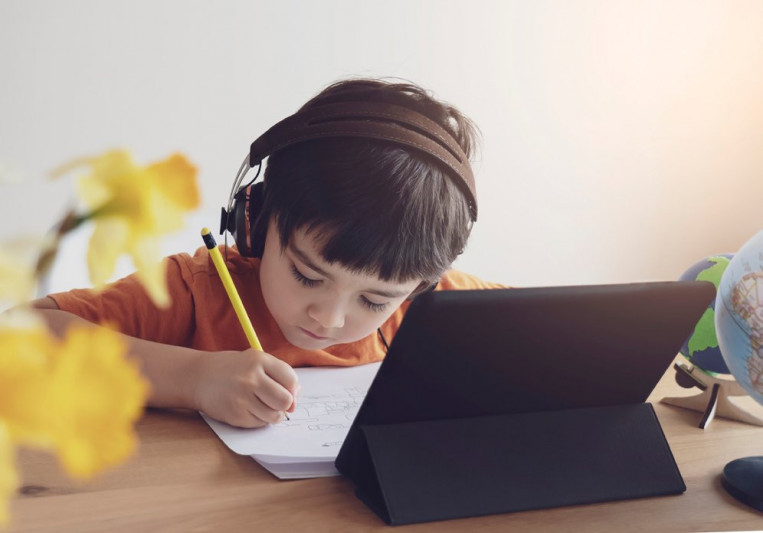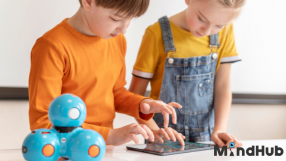
Even before the pandemic, online studying began to spread more and more. Now, however, it is more important than ever to put our children’s health and safety first.
130 countries have closed their schools (UNESCO), and almost 1 billion children are out of classrooms. Still, some studies show that, on average, students absorb 25-60% more material when studying online, compared to only 8-10% in the classroom.
From MindHub, we also managed to adapt our program to be accessible, innovative, and enjoyable for every kid, even online. Within a month, nearly 90% of our students went into remote studying. With the help of qualified and motivated mentors with experience in online teaching, they continued their development and accumulation of new knowledge in the world of programming. Thus, the innovative and quality training of MindHub managed to reach over 2,500 children worldwide in Bulgaria, Romania, Estonia, Finland, and the USA.
What are the advantages of studying online?
There are many benefits to studying online, including the convenience and comfort of being flexible and studying anywhere, anytime. Some parents think that the child's attention can be difficult to hold when standing in front of a monitor. However, this access to information is actually attractive, and with the right approach from the mentors, it becomes a favorite moment of the process for the kids.
Through MindHub's online training, we develop additional skills in children. They become more responsible and know that we expect them to prepare their computer and files for work by themselves. Processing these files and working with them - saving, editing, and other activities are part of building their computer education. And when you have to deal with it yourself, the effect is much more significant. Mentors assign them exercises and goals, and it is up to them to deal with everything, which increases their motivation.
Why do kids love online education?
Children who are already part of the MindHub family join online training with great pleasure and excitement. This gives them the opportunity, despite the situation with COVID-19, to see their favorite mentors and friends from the groups.
Online classes also include many practical parts, allowing children to experience and cope with the challenges on their own. Those who fail the first time receive virtual support from their peers and come together as a team.
Each child enjoys with pride the demonstrations of their project to the others in the group.
Another reason they enjoy studying online so much is that they can control the learning process, which motivates them to be more responsible and disciplined. Kids work with personal equipment, which remains with them, and they can continue to practice even after classes. The whole process becomes a great flow of the day and is a good time with friends and mentors, loved by all.
Who are our online activities suitable for?
Our digital workshops and programming courses are suitable for children and teenagers from 6 to 15 years. We use some of the most innovative teaching methods - through block games, tasks, and fun interactive approaches. Every day, our mentors work on special training for online teaching that is most effective for children.
There are between 6 and 8 people in each online group so that everyone can be paid individual attention and the process goes more smoothly. Children can easily communicate with each other and ask their questions to the mentors when they need it without slowing down the process.
Online lessons last between 1 and 3 hours, depending on the activities and the tools used. We try to have enough breaks during the classes so that the children do not feel burdened, but to rest and be active during the learning process.
What approach do our mentors use to keep children's attention online?
Apart from presenting the information in an exciting way for the children, our mentors consider it their primary goal to keep their attention. This happens by asking questions that stimulate children to think and reproduce what they have learned in their own words and in the way they understand it.
When kids need help, they share their screen, and everyone checks for mistakes in their friend's code, giving ideas on how to fix them, which is even harder to achieve in a real environment than online. It is received with great enthusiasm by children, who find it a fun challenge.
During the online lessons, the mentors apply various techniques to motivate them to think creatively and logically by analyzing the tasks set for them and finding solutions to problems.
Another essential element of studying online is the addition of using cameras. Mentors monitor whether they have the children’s full attention, and if they notice that they are losing the interest of some of the kids, they can engage them through questions or additional tasks. This is a technique applied not only to children with less focus on activities but also to those who cope faster with their assignments. They are encouraged to find more complex options and techniques to maintain interest in the training and make it useful.
Should the parent be with the child all the time?
Most children are entirely successful on their own during the online training at MindHub. That's why we don't think it needs to be accompanied by a parent throughout the lesson. We recommend that this only happens at the beginning of the class, when they may require technical adjustments. If your child is younger, we advise you to be close if they need any help.
During the rest of the time, you can safely let your child immerse in the learning process and get the most out of it. When studying online and being responsible at a young age, kids build many qualities that will be useful in the future.


